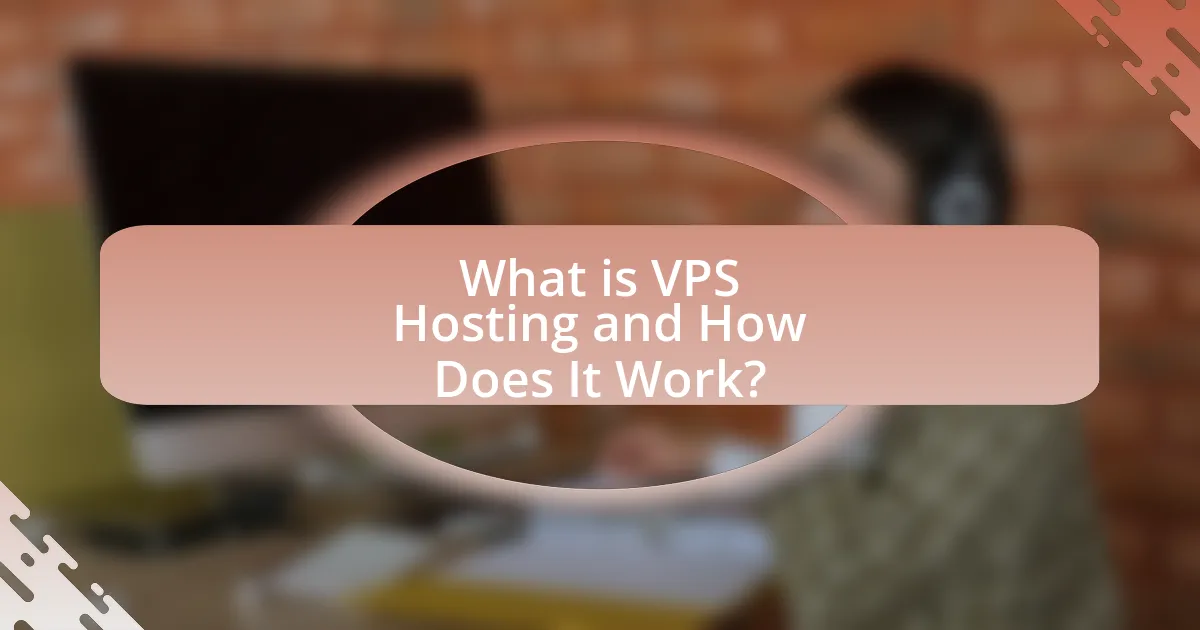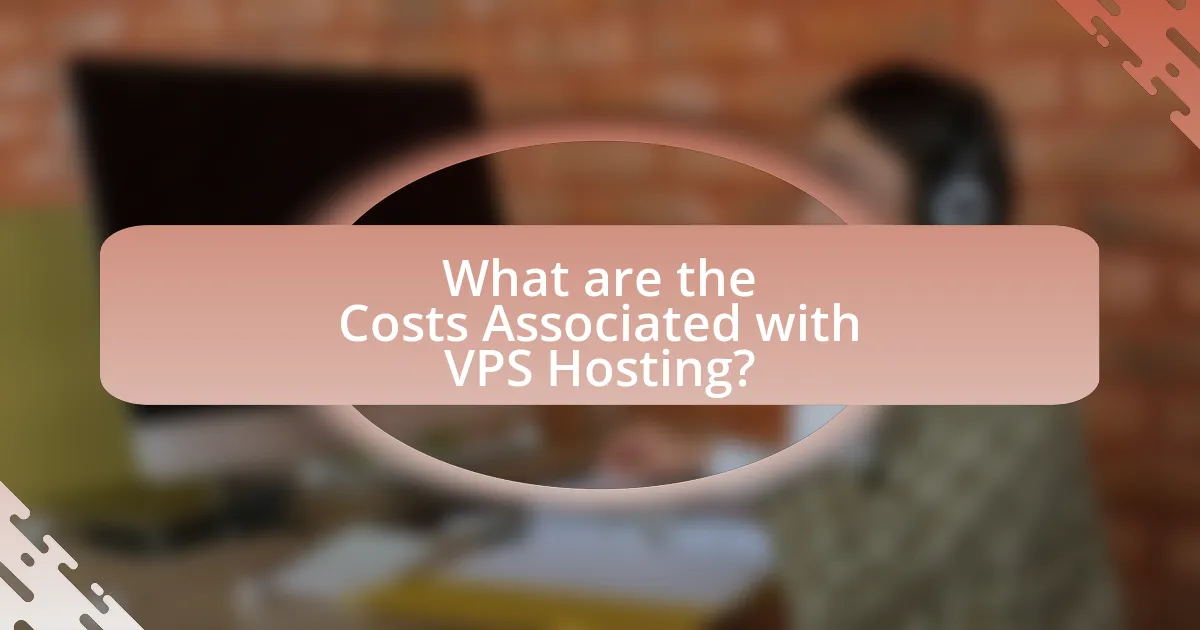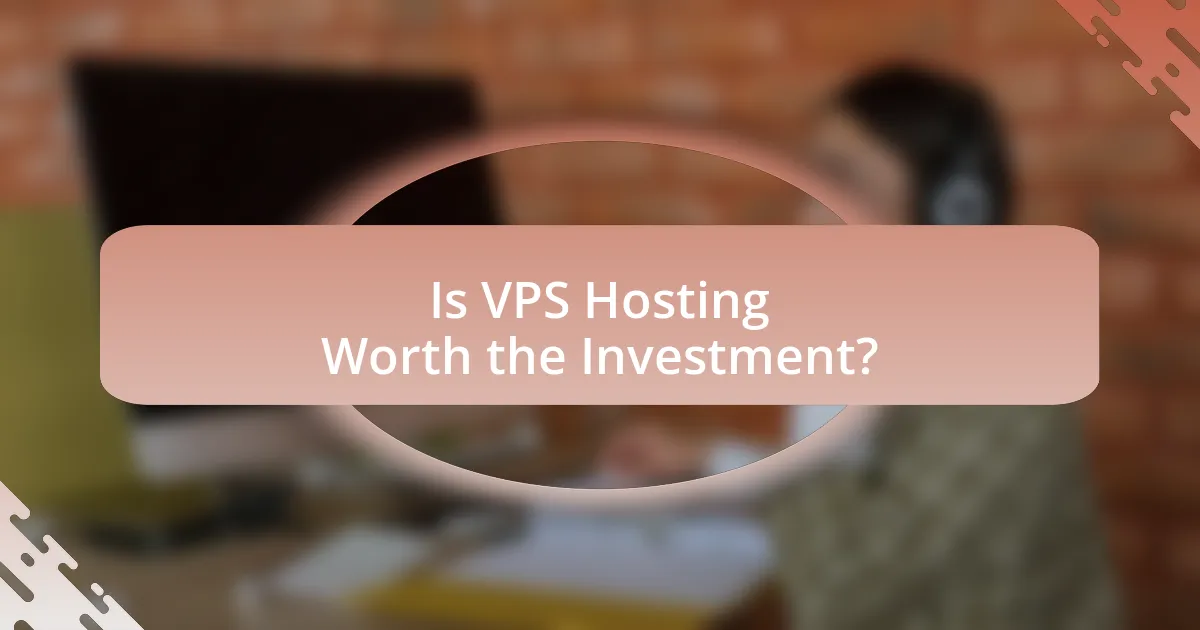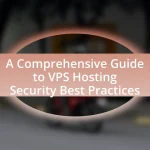VPS hosting, or Virtual Private Server hosting, is a web hosting solution that utilizes virtualization technology to provide dedicated resources on a shared physical server. This article analyzes the cost-effectiveness of VPS hosting, comparing it to shared and dedicated hosting options, and discusses its key features, including dedicated resources, scalability, and enhanced security. It also examines the different types of VPS hosting, the factors influencing pricing, and the potential benefits and drawbacks associated with this hosting solution. Ultimately, the article aims to determine whether investing in VPS hosting is a worthwhile decision for businesses seeking improved performance and control over their online presence.

What is VPS Hosting and How Does It Work?
VPS hosting, or Virtual Private Server hosting, is a type of web hosting that uses virtualization technology to provide dedicated resources on a physical server shared with other users. In VPS hosting, a single physical server is divided into multiple virtual servers, each operating independently with its own operating system and resources, such as CPU, RAM, and storage.
This setup allows users to have more control and flexibility compared to shared hosting, as they can install custom software and configure their server environment. VPS hosting is particularly beneficial for businesses that require reliable performance and scalability without the cost of a dedicated server. According to a report by HostingAdvice, VPS hosting can offer significant cost savings while providing enhanced performance and security features, making it a worthwhile investment for many users.
What are the key features of VPS Hosting?
VPS hosting offers several key features, including dedicated resources, scalability, enhanced security, and root access. Dedicated resources ensure that users have guaranteed CPU, RAM, and storage, which leads to improved performance compared to shared hosting. Scalability allows users to easily upgrade their resources as their needs grow, making it a flexible option for businesses. Enhanced security features, such as isolated environments and customizable firewalls, protect against threats more effectively than shared hosting. Root access provides users with full control over their server environment, enabling them to install and configure software as needed. These features collectively make VPS hosting a robust solution for businesses seeking reliability and performance.
How does virtualization technology enable VPS Hosting?
Virtualization technology enables VPS hosting by allowing a single physical server to be divided into multiple virtual servers, each operating independently. This is achieved through hypervisor software, which allocates resources such as CPU, memory, and storage to each virtual server, ensuring that they function as separate entities. For instance, a physical server can host several VPS instances, each capable of running its own operating system and applications, which maximizes resource utilization and reduces costs. This technology not only enhances flexibility and scalability but also provides isolation, meaning that issues in one VPS do not affect others, thereby improving overall server reliability.
What resources are allocated to a VPS?
A Virtual Private Server (VPS) is allocated specific resources including CPU, RAM, disk space, and bandwidth. Each VPS operates within a dedicated environment, ensuring that these resources are reserved for its use, which enhances performance and reliability compared to shared hosting. For instance, a typical VPS may offer 1 to 8 CPU cores, 1 to 32 GB of RAM, and 20 to 500 GB of SSD storage, depending on the hosting plan. This allocation allows users to run applications and websites with greater efficiency and control, making VPS a viable option for businesses seeking dedicated resources without the cost of a full dedicated server.
What are the different types of VPS Hosting?
The different types of VPS hosting include managed VPS, unmanaged VPS, cloud VPS, and hybrid VPS. Managed VPS hosting provides users with server management services, including updates and security, allowing them to focus on their applications. Unmanaged VPS hosting requires users to manage the server themselves, offering greater control but demanding more technical expertise. Cloud VPS hosting utilizes multiple servers to provide scalability and reliability, distributing resources across a network. Hybrid VPS hosting combines features of both cloud and traditional VPS, offering flexibility and performance. Each type caters to different user needs, making VPS hosting a versatile option for various applications.
How do managed and unmanaged VPS differ?
Managed VPS provides users with a hosting environment where the service provider handles server management tasks such as updates, security, and technical support, allowing users to focus on their applications. In contrast, unmanaged VPS requires users to manage all server-related tasks themselves, including installation, maintenance, and troubleshooting, which demands a higher level of technical expertise. The distinction is significant as managed VPS typically incurs higher costs due to the additional services provided, while unmanaged VPS is more cost-effective but may lead to increased operational challenges for users lacking technical skills.
What are the pros and cons of each VPS type?
The pros and cons of each VPS type are as follows:
-
Managed VPS: The primary advantage of managed VPS is that it includes technical support and maintenance, allowing users to focus on their applications rather than server management. This type is ideal for those lacking technical expertise. However, the downside is the higher cost associated with the management services, which can be a barrier for budget-conscious users.
-
Unmanaged VPS: The main benefit of unmanaged VPS is the lower cost, as users have full control over the server and can customize it to their needs. This is suitable for technically skilled users who prefer flexibility. Conversely, the con is that it requires significant technical knowledge and time investment for setup and maintenance, which can be challenging for less experienced users.
-
Cloud VPS: Cloud VPS offers scalability and flexibility, allowing users to easily adjust resources based on demand. This is particularly advantageous for businesses with fluctuating traffic. However, the potential downside is that costs can become unpredictable, as users may incur charges based on resource usage, leading to budget management challenges.
-
KVM VPS: KVM VPS provides dedicated resources and better performance due to its virtualization technology. This is beneficial for resource-intensive applications. On the downside, KVM VPS can be more complex to manage and may require advanced technical skills, which can deter some users.
-
OpenVZ VPS: The advantage of OpenVZ VPS is its efficient resource usage and lower cost, making it accessible for small businesses. However, the limitation is that it does not offer true virtualization, which can lead to performance issues if one user consumes excessive resources, affecting others on the same server.
These pros and cons highlight the varying needs and expertise levels of users when selecting a VPS type, impacting their overall investment in VPS hosting.

What are the Costs Associated with VPS Hosting?
The costs associated with VPS hosting typically range from $20 to $100 per month, depending on the provider and the resources allocated. This pricing reflects factors such as CPU power, RAM, storage space, and bandwidth. For instance, a basic VPS plan may offer 1 GB of RAM and 20 GB of storage for around $20, while a more robust plan with 4 GB of RAM and 80 GB of storage can cost approximately $50. Additionally, some providers may charge extra for managed services, backups, and security features, which can further increase the overall cost.
What factors influence the pricing of VPS Hosting?
The pricing of VPS hosting is influenced by several key factors, including resource allocation, server location, management level, and provider reputation. Resource allocation refers to the amount of CPU, RAM, and storage assigned to the VPS; higher allocations typically lead to increased costs. Server location affects pricing due to varying operational costs in different regions, with data centers in high-demand areas often charging more. The level of management, whether unmanaged or fully managed services, also impacts pricing, as managed services generally incur higher fees due to the additional support provided. Lastly, the reputation of the hosting provider can influence pricing, as established providers may charge a premium for reliability and customer service.
How do resource allocation and performance affect costs?
Resource allocation and performance directly influence costs by determining the efficiency and effectiveness of resource utilization in a given system. When resources, such as CPU, memory, and bandwidth, are allocated optimally, performance improves, leading to reduced operational costs due to lower resource wastage and enhanced productivity. Conversely, poor resource allocation can result in bottlenecks, increased downtime, and higher costs associated with underperformance or over-provisioning. For instance, a study by Gartner indicates that organizations can save up to 30% on IT costs through effective resource management, highlighting the financial impact of strategic resource allocation on overall costs.
What role do additional services play in VPS pricing?
Additional services significantly influence VPS pricing by adding value and functionality to the base hosting package. These services, which may include enhanced security features, backup solutions, managed support, and performance optimization tools, can lead to higher costs but also provide essential benefits that justify the investment. For instance, a study by HostingAdvice found that VPS plans with managed services can increase costs by 20-50%, yet they often result in improved uptime and reduced maintenance efforts for users. Thus, while additional services raise the overall price of VPS hosting, they also enhance the user experience and operational efficiency, making them a critical factor in the pricing structure.
How does VPS Hosting compare to other hosting options in terms of cost?
VPS hosting typically costs more than shared hosting but less than dedicated hosting. Shared hosting can range from $2 to $10 per month, while VPS hosting generally starts around $20 and can go up to $100 per month, depending on resources. Dedicated hosting, on the other hand, often exceeds $100 per month, making VPS a middle-ground option. This pricing structure reflects the level of resources and control provided; VPS offers dedicated resources and greater customization compared to shared hosting, while being more affordable than dedicated servers.
What are the cost differences between VPS, shared, and dedicated hosting?
VPS hosting typically costs between $20 to $100 per month, shared hosting ranges from $2 to $10 per month, and dedicated hosting can range from $80 to over $500 per month. Shared hosting is the most economical option, suitable for small websites with low traffic, while VPS hosting offers a balance of cost and performance for medium-sized sites. Dedicated hosting, being the most expensive, provides maximum resources and control, ideal for large businesses or high-traffic websites. These cost ranges reflect the level of resources, performance, and support provided by each hosting type, with shared hosting offering minimal resources, VPS providing a moderate level, and dedicated hosting delivering the highest level of service and customization.
How does the long-term investment in VPS Hosting compare to alternatives?
Long-term investment in VPS Hosting typically offers better value compared to alternatives like shared hosting or dedicated servers. VPS Hosting provides dedicated resources, scalability, and enhanced performance, which are crucial for growing businesses. In contrast, shared hosting can lead to slower speeds and limited resources, while dedicated servers are often more expensive and may not be necessary for all users. According to a study by HostingAdvice, VPS Hosting can reduce operational costs by up to 30% over three years compared to dedicated servers, while still providing the flexibility needed for growth. This makes VPS Hosting a cost-effective solution for businesses looking to balance performance and budget in the long run.

Is VPS Hosting Worth the Investment?
VPS hosting is worth the investment for businesses that require enhanced performance, security, and control over their hosting environment. Unlike shared hosting, VPS provides dedicated resources, which leads to improved website speed and reliability. According to a study by HostingAdvice, VPS hosting can increase website performance by up to 30% compared to shared hosting. Additionally, VPS allows for greater customization and scalability, enabling businesses to adapt their hosting solutions as they grow. This flexibility, combined with the enhanced security features that protect against threats, makes VPS hosting a valuable investment for those looking to optimize their online presence.
What are the benefits of investing in VPS Hosting?
Investing in VPS Hosting offers enhanced performance, scalability, and security compared to shared hosting. VPS Hosting allocates dedicated resources, ensuring faster load times and improved website performance, which is crucial for user experience and SEO rankings. Additionally, it allows for easy scalability, enabling businesses to upgrade resources as their needs grow without significant downtime. Security is also a key benefit, as VPS Hosting provides isolated environments, reducing the risk of vulnerabilities associated with shared servers. According to a study by HostingAdvice, 70% of businesses reported improved site performance after switching to VPS Hosting, highlighting its effectiveness in meeting modern hosting demands.
How does VPS Hosting enhance website performance and reliability?
VPS hosting enhances website performance and reliability by providing dedicated resources that are not shared with other users. This isolation ensures that websites experience consistent speed and uptime, as they are not affected by the traffic or resource usage of neighboring sites. For instance, VPS hosting typically allocates a specific amount of CPU, RAM, and bandwidth to each virtual server, which leads to improved load times and responsiveness. Additionally, VPS environments often include advanced features such as SSD storage and optimized server configurations, which further boost performance. According to a study by HostingAdvice, websites on VPS hosting can load up to 30% faster than those on shared hosting, demonstrating a clear advantage in both performance and reliability.
What security advantages does VPS Hosting offer?
VPS Hosting offers enhanced security advantages compared to shared hosting by providing isolated environments for each user. This isolation means that if one VPS is compromised, others on the same physical server remain secure, reducing the risk of cross-contamination from security breaches. Additionally, VPS Hosting allows for customized security configurations, enabling users to implement specific firewalls, intrusion detection systems, and other security measures tailored to their needs. Furthermore, VPS providers often include regular security updates and monitoring, which help protect against vulnerabilities and attacks. This combination of isolation, customization, and proactive management significantly enhances the overall security posture of VPS Hosting.
What are the potential drawbacks of VPS Hosting?
The potential drawbacks of VPS hosting include higher costs compared to shared hosting, the need for technical expertise, and potential resource limitations. VPS hosting typically costs more than shared hosting due to the dedicated resources and improved performance it offers. Users must also possess a certain level of technical knowledge to manage the server effectively, as many VPS plans do not include managed services. Additionally, while VPS provides dedicated resources, it may still face limitations in terms of CPU and RAM, especially if the hosting provider oversells their resources. These factors can impact the overall value proposition of VPS hosting for some users.
How can the complexity of VPS management impact users?
The complexity of VPS management can significantly impact users by increasing the time and expertise required to effectively operate their virtual servers. Users may face challenges such as configuring server settings, managing security protocols, and troubleshooting issues, which can lead to downtime and potential data loss. According to a survey by HostingAdvice, 70% of users reported that the technical demands of VPS management were a barrier to their effective use of the service. This complexity can result in higher operational costs, as users may need to hire specialized personnel or invest in additional training to manage their VPS effectively.
What are the risks of underestimating resource needs?
Underestimating resource needs can lead to project delays, increased costs, and compromised quality. When organizations fail to accurately assess the resources required, they may encounter unexpected shortages that hinder progress, resulting in missed deadlines. For instance, a study by the Project Management Institute found that 39% of projects fail due to inadequate resource allocation. Additionally, insufficient resources can force teams to cut corners, ultimately affecting the quality of the final product or service. This miscalculation can also lead to budget overruns, as organizations scramble to acquire additional resources at higher costs, further straining financial projections.
What tips can help maximize the value of VPS Hosting?
To maximize the value of VPS Hosting, users should optimize resource allocation, implement security measures, and regularly monitor performance. Optimizing resource allocation involves selecting the right plan that matches the specific needs of the website or application, ensuring that CPU, RAM, and storage are adequately provisioned without overspending. Implementing security measures, such as firewalls and regular updates, protects against vulnerabilities, which can save costs associated with data breaches. Regularly monitoring performance through analytics tools allows users to identify bottlenecks and adjust resources accordingly, enhancing efficiency and reducing downtime. These strategies collectively ensure that users gain the most benefit from their VPS investment.
How can users optimize their VPS for better performance?
Users can optimize their VPS for better performance by implementing resource allocation strategies, optimizing software configurations, and utilizing performance monitoring tools. Properly allocating CPU, RAM, and storage resources ensures that the VPS runs efficiently, as under-provisioning can lead to slow performance while over-provisioning can increase costs unnecessarily. Additionally, optimizing software configurations, such as using lightweight applications and configuring web servers for speed, can significantly enhance performance. Utilizing performance monitoring tools allows users to identify bottlenecks and make informed adjustments, ensuring that the VPS operates at peak efficiency. These strategies collectively contribute to improved performance and cost-effectiveness in VPS hosting.
What best practices should be followed for VPS management?
The best practices for VPS management include regular updates, resource monitoring, security hardening, and backup implementation. Regular updates ensure that the operating system and software are patched against vulnerabilities, reducing the risk of exploitation. Resource monitoring allows administrators to track CPU, memory, and disk usage, enabling proactive management of resources to prevent performance degradation. Security hardening involves configuring firewalls, using strong passwords, and disabling unnecessary services to protect the VPS from unauthorized access. Implementing regular backups safeguards data against loss due to hardware failure or cyberattacks, ensuring business continuity. These practices are essential for maintaining optimal performance and security in a VPS environment.


